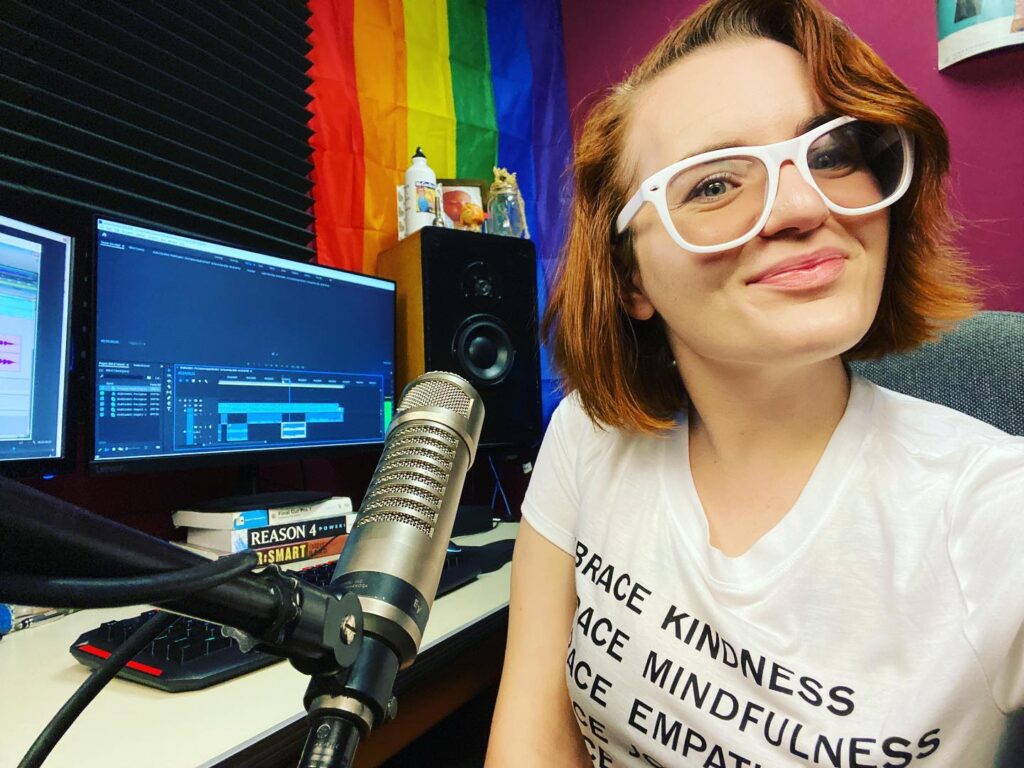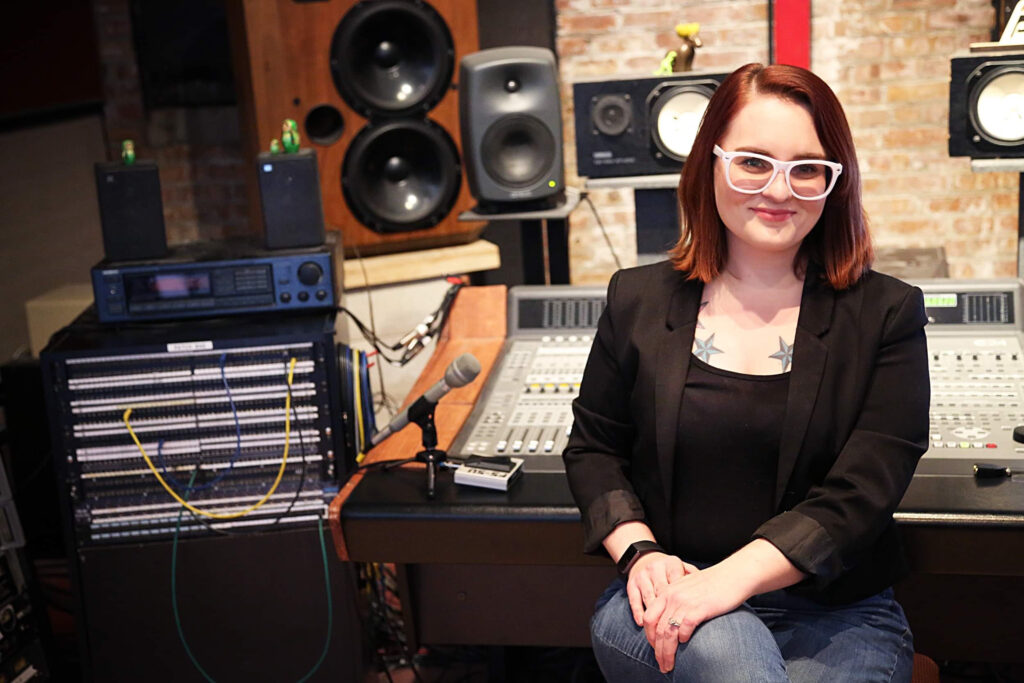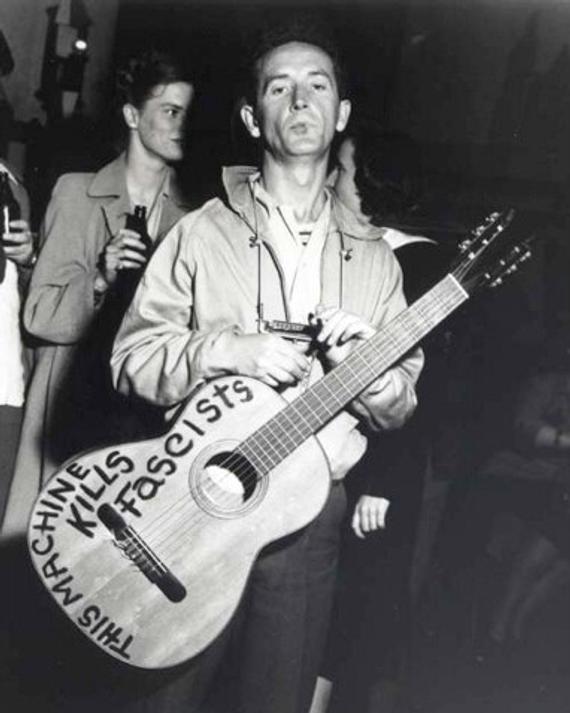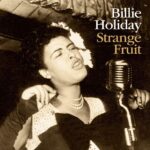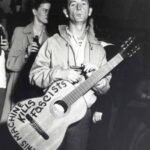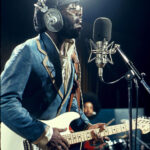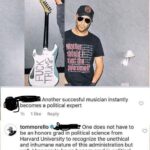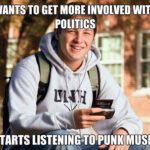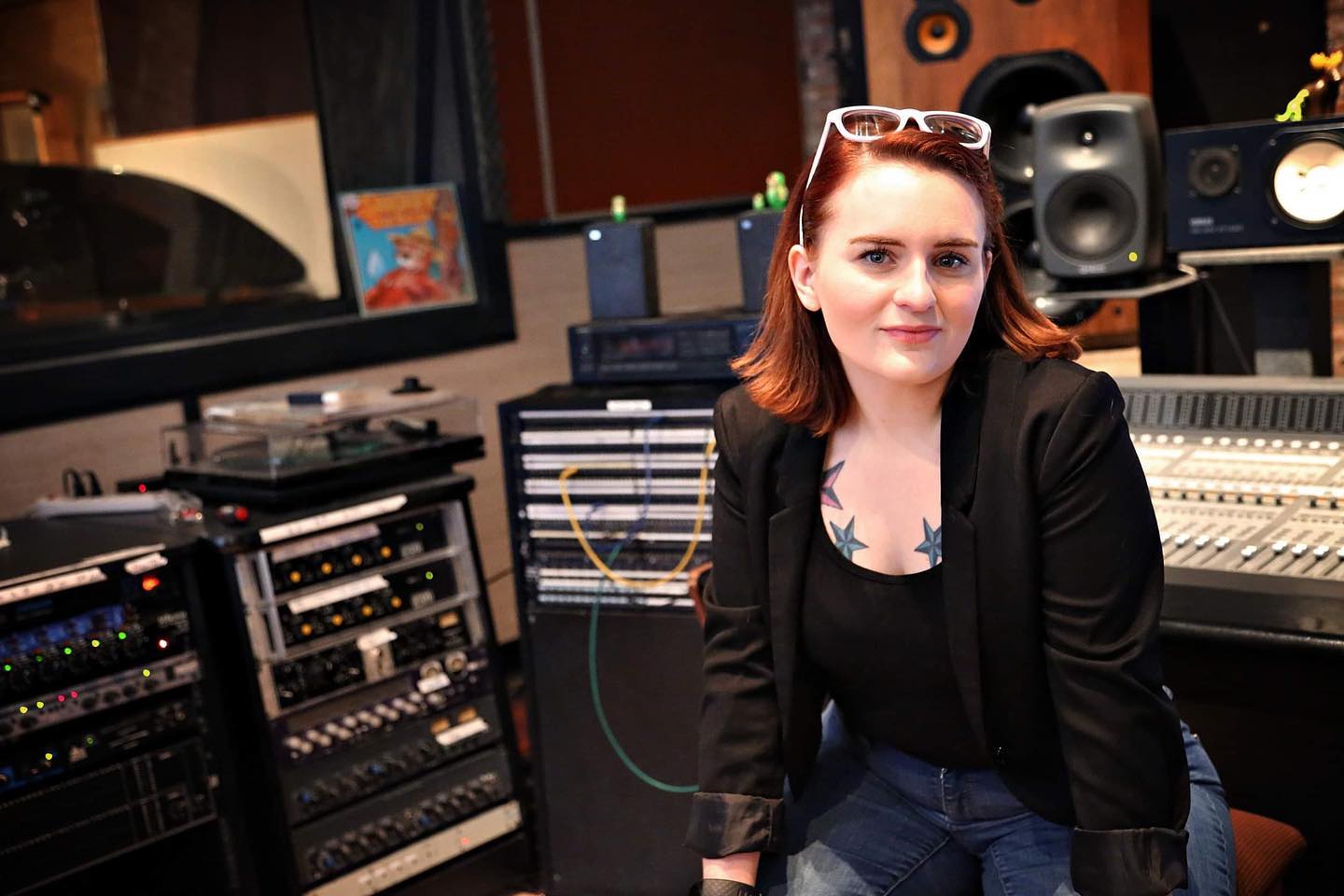
Audrey Martinovich – Studio Owner, Recording Engineer, & Producer
Audrey Martinovich is a recording engineer and producer that specializes in acoustic music such as classical, jazz, and folk. She co-owns & engineers at a recording studio in Madison, Wisconsin called Audio for the Arts and produces podcasts. She has been working in audio for eight years and has been a full-time studio owner & recording engineer for three years. She has recently worked with The Madison Symphony Orchestra, the Wisconsin Chamber Orchestra, and Wisconsin Youth Symphony Orchestra, and artists Johannes Wallman & Sam Ness. She produces the Big Wild Radio Show every week, which reaches over 100,000 listeners and has engineered remote guests for podcasts such as Alan Alda’s podcast, Pod Save America, NPR’s A1, & Terrible, Thanks for Asking.
Early Career – Opera, Experimenting with Mics, & Looking the Part
Audrey has always had an interest in music and signed up for every possible music class in school. In addition to vocal lessons, she also took classes on piano, guitar, and music theory. She discovered her interest in audio engineering while studying opera in high school. She and her teacher, Alisanne Apple, would record her vocal lessons to get an audience perspective on technique, ensuring diction and tone came across well. This was her first experience with microphones & experimenting with microphone placement. She then bought her own microphone and tried plugging it straight into the mic input on her computer, no mic pre, and when it didn’t work, she wanted to learn how to get it to work. At the same time, she began researching sound design and had an epiphany that she could create and manipulate sound as a career. From there, she attended Madison Media Institute for Recording and Music Technology, Entertainment, and Media Business and received a Bachelor of Science degree with flying colors.
A Crash Course in Audio
How did you get your start?
When I was about to graduate college I started looking up studios in my area and making some calls, trying to get my foot in the door. I actually saw Audio for the Arts and tried to call, but the phone number on the website didn’t work! The owners at the time, Buzz Kemper and Steve Gotcher happened to reach out to the career advisor at my school the same week and asked for a few students to come by and interview for an internship. They liked my classical music background since Audio for the Arts works with a lot of chamber groups and the fact that I showed up looking ready for a job interview (not in “a ripped Metallica t-shirt”) so they thought I would represent the studio well.
How did your early internships or jobs help build a foundation for where you are now?
Before the internship at Audio for the Arts, I shadowed a FOH engineer at another company for a Battle of the Bands event. That day was a crash course in live sound and troubleshooting quickly. Shortly after, I started interning at Audio for the Arts. At first, I did a lot of data archiving which really laid the foundation for data management. Then, I officially became an employee and assisted on PA gigs, mostly running cables and placing microphones. They saw that I was good in that environment and introduced me to remote recording.
Did you have a mentor or someone that helped you?
Buzz Kemper and Steve Gotcher taught me so much. Kevin Guarnieri was an instructor of mine in college and he introduced me to Pro Tools which is so vital for me.
Current Career – The Importance of Being Proactive & Meeting Deadlines
What is a typical day like for you on the job?
I usually get to the studio around 9 or 10 am. If I have any sessions happening at any point that day, I always set up and test gear first, even if the session isn’t for several hours and it’s a 10-minute setup. That way, I know I’m ready and can lose myself in whatever emailing I have to do until my client arrives. Typically, this includes scheduling and coming up with estimates for gigs. Earlier hours in the day are usually radio, podcast, or commercial production with voice talent and producer in the booth or connected remotely. Then, I either reset the studio for an afternoon music recording session or dive into some mixing, either alone or attended. One day a week I bring my son to the studio with me and he does schoolwork while I edit and mix the whole day.
How do you stay organized and focused?
I try to identify my pitfalls and trick myself into avoiding them. For example, if I get an email that needs a response, but not at that second, I have to mark it unread otherwise I will forget to come back to that email. It’s the same way with texts and messages. I just can’t open the message till I can actually tackle the to-do list or I will forget. As an added bonus, having unread messages in my inbox gives me a bit of urgency to cross items off my to-do list.
What do you enjoy the most about your job?
Getting to work on a variety of projects in a day and being exposed to all sorts of amazing music.
What do you like least?
The sometimes crazy hours and stress of deadlines. It makes it hard to spend much time at home.
What’s the hardest part about your job?
The coordination that leads up to a gig such as coordinating logistics and drafting estimates. Figuring out exactly what the client wants, how to deliver it, and then assigning a dollar amount to it is something a lot of creatives struggle with and I’m no different.
What is your favorite day off activity?
Going for a hike or walk with my son or working on house renovations.
What are your long-term goals?
To work on music that really resonates with people and to feel fulfilled. I’d be thrilled to ever win a Grammy for Producer of the Year since no woman has ever won that category, but I really don’t want to be the first. That honor belongs to someone like Linda Perry.
What are your short-term goals?
I look at my short-term goals as if they are a to-do list so there are things like “revamp the studio’s website” on there, but generally, I’d like to work more on albums than singles. I like seeing how a song’s meaning can change when it’s contextualized within an album and want that to be a bigger percentage of my work in the future.
#1 tool/piece of gear you can’t live without?
Pro Tools
What’s one mistake you’ve made/bad gig you’ve had and how did you learn from it/overcome it?
It’s hard, but there are certain types of people that you have to assert yourself around or they can be abusive. I had a client come in to record a backing track of a song they had written to pitch to a potential singer. This guy came in with an attitude, looking for any reason to throw a fit. We did a first piano take and he wanted to layer it and when we did, it turned out that the base take was too short. He screamed at me for “deleting part of his performance” when he had actually counted his rests incorrectly and came in too early, resulting in a shorter song. Had this happened really early in my career, I probably would have defaulted to the “the customer is always right” perspective and let it slide. Instead, I invited him into the control room, had him sit down at my computer, and asked him to point out where any edits had been made on the track. He couldn’t find any edits, because obviously there were no edits to be found. He definitely wasn’t sunshine and rainbows after that, but he was less quick to react after that. If you don’t correct abusive behavior like that, it will continue and nobody deserves that. It doesn’t matter who the artist is.
Advice you have for other womxn who wish to enter the field?
Listen to music constantly. Make music constantly. Even if it sucks, one day it won’t. You have to go through the sucky material to get to the good stuff first! See if any friends or local bands want to record so you can practice. Then you’ll have demo material and testimonials you can take to a studio or to whoever.
Must have skills?
A proactive attitude is a must. Even if you don’t know much about recording, if you have the ability to see a problem and address it before it becomes a bigger problem, or better yet, before anyone notices, I want you to assist me.
What other skills/hobbies do you have that you feel help you in your line of work?
Playing an instrument helps with being able to communicate with the artist. It’s good to be able to understand what to do when an artist says they want to “punch in the Bm7 chord in the bridge so give me an 8 count before that chord.”
Favorite gear?
I love good analog preamps and things with tubes, whether it’s a microphone, mic pre, compressor, whatever.
How has your career been affected by Covid-19, & how have you adapted to the current situation?
We normally record quite a few choral and orchestral concerts every spring and winter, however, all of the concerts have been canceled. Most of these large ensemble groups have switched to putting together virtual events so we have been doing a lot of video production and live streaming since lockdown.
More About Audrey
- Studio Website: Audio for the Arts
- Articles written by Audrey:
- Pro Tooks Expert
- The Case for Keeping Music Political
- Interview on Produced by a Girl Podcast
- Interview on Working Class Audio
- Audrey on The SoundGirls Podcast
Find More Profiles on The Five Percent
Profiles of Women in Audio
